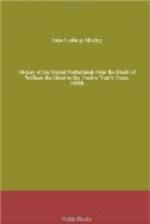This advance was graciously met by the stadholder, and the two distinguished personages were, for the time at least, reconciled.
It was further debated as to the number of troops that it be advisable for the States to maintain during the truce and Barneveld expressed his decided opinion that thirty thousand men, at least, would be required. This opinion gave the prince at least as much pleasure as did the personal devotion expressed by the Advocate, and he now stated his intention of working with the peace party.
The great result was now certain. Delft and Amsterdam withdrew from their opposition to the treaty, so that Holland was unanimous before the year closed; Zeeland, yielding to the influence of Maurice, likewise gave in her adhesion to the truce.
The details of the mode in which the final arrangement was made are not especially interesting. The discussion was fairly at an end. The subject had been picked to the bones. It was agreed that the French ambassadors should go over the frontier, and hold a preliminary interview with the Spanish commissioners at Antwerp.
The armistice was to be continued by brief and repeated renewals, until it should be superseded by the truce of years:
Meantime, Archduke Albert sent his father confessor, Inigo Brizuela, to Spain, in order to make the treaty posed by Jeannin palatable to the king?
The priest was to set forth to Philip, as only a ghostly confessor could do with full effect, that he need not trouble himself about the recognition by the proposed treaty of the independence of the United Provinces. Ambiguous words had been purposely made use of in this regard, he was to explain, so that not only the foreign ambassadors were of opinion that the rights of Spain were not curtailed, but the emptiness of the imaginary recognition of Dutch freedom had been proved by the sharp criticism of the States.
It is true that Richardot, in the name of the archduke, had three months before promised the consent of the king, as having already been obtained. But Richardot knew very well when he made the statement that it was false. The archduke, in subsequent correspondence with the ambassadors in December, repeated the pledge. Yet, not only had the king not given that consent, but he had expressly refused it by a courier sent in November.
Philip, now convinced by Brother Inigo that while agreeing to treat with the States-General as with a free commonwealth, over which he pretended to no authority, he really meant that he was dealing with vassals over whom his authority was to be resumed when it suited his convenience, at last gave his consent to the, proposed treaty. The royal decision was, however, kept for a time concealed, in order that the States might become more malleable.




